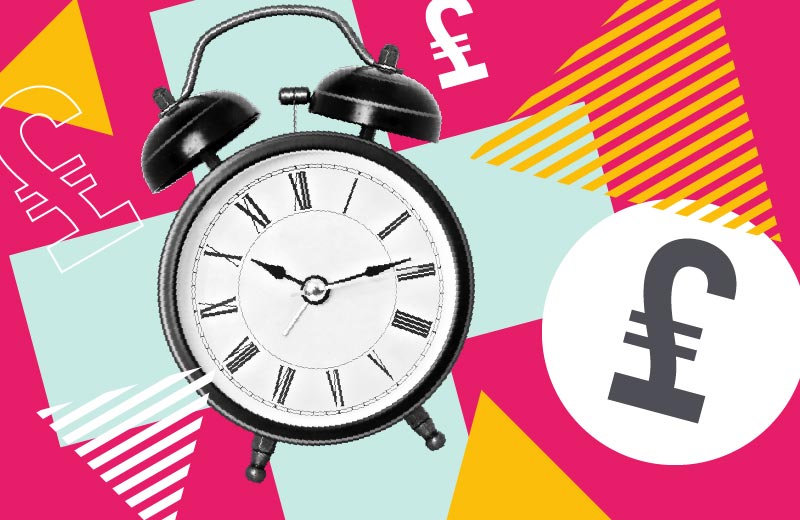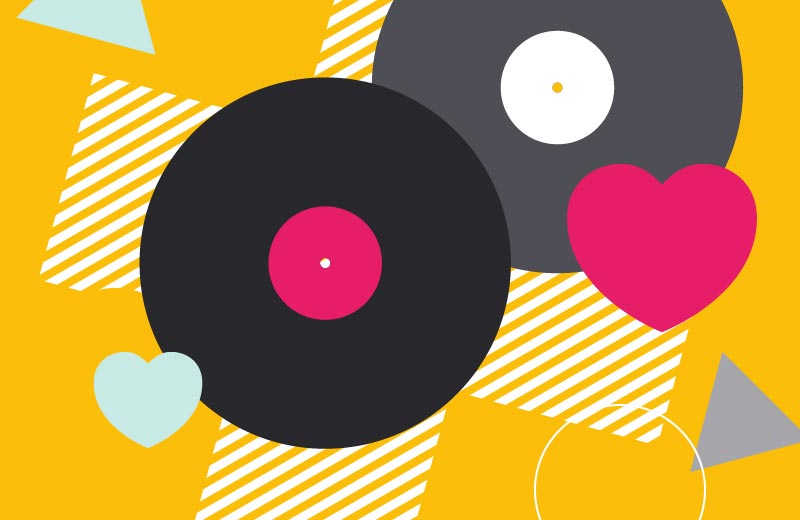
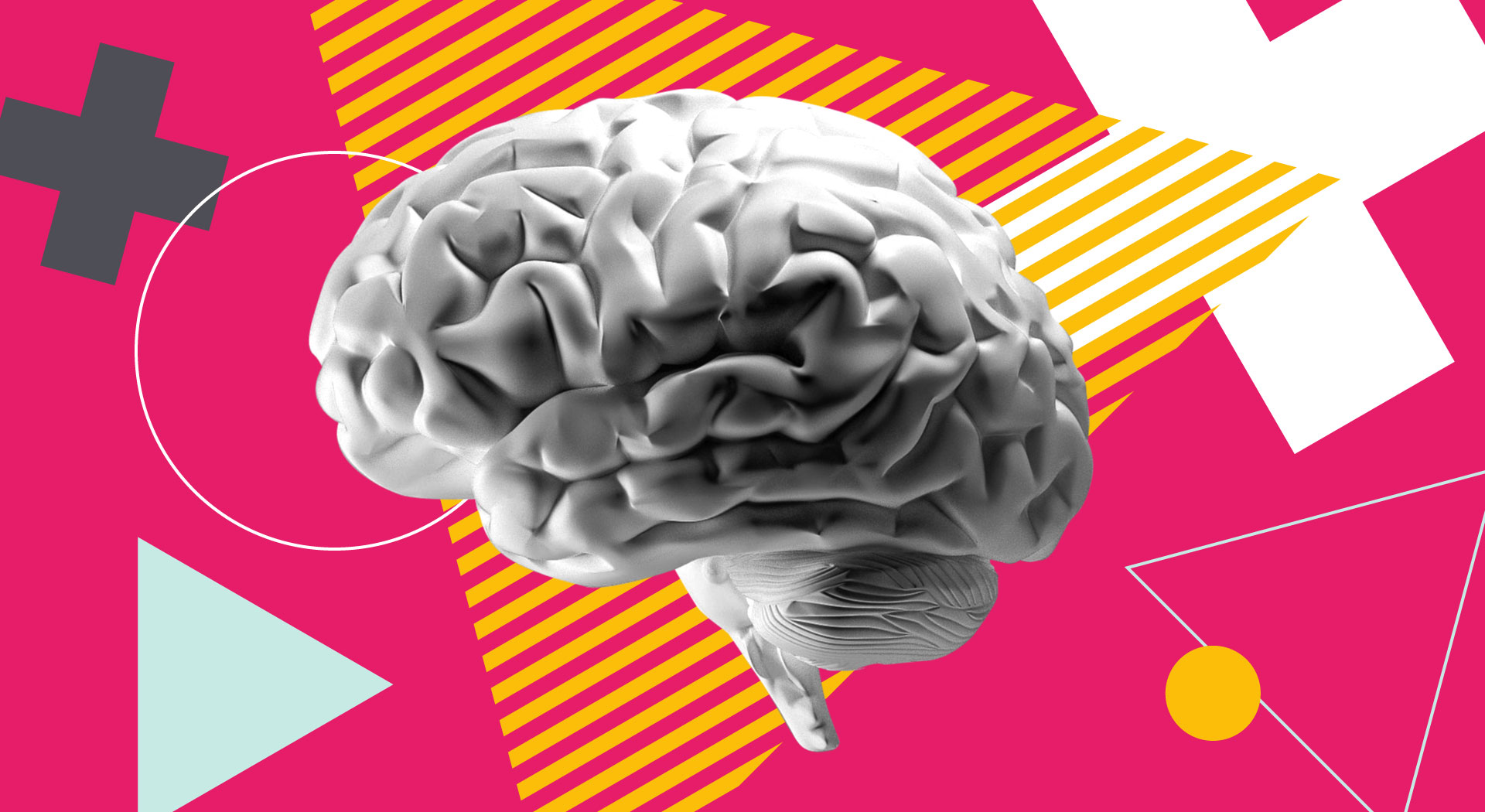
I've very recently received a diagnosis. I have ADHD. I feel validated finally!
But what is ADHD?
According to ADHDuk.co.uk, “ADHD is a mental health condition that is defined through analysis of behaviour. People with ADHD show a persistent pattern of inattention and/or hyperactivity–impulsivity that interferes with day-to-day functioning and/or development.”
Studies show that people with ADHD have physically different brains than people who do not have ADHD – it's even detectable on X-rays and MRI scans.
Our frontal lobes mature more slowly than our neurotypical peers. The networks in our brains work differently from those of neurotypical people which is why ADHDers have a hard time switching between different types of tasks, planning and focusing. Some studies show that two neurotransmitters, dopamine and norepinephrine, play a role in ADHD as well.

Why have I suddenly got a diagnosis now?
I'm 41 years old and I've got this far in life without a diagnosis, so why now?
The symptoms have always been there, I just didn't know why I felt different and hadn't realised it was all connected. I'm really good at masking my traits, so for a long time, I felt as if it wasn't a problem because I appear very functional to the outside world. I have burnt myself out over and over again without knowing why I can never seem to stop and why nothing I do feels enough.
There also hasn't been a lot of progress in understanding ADHD and especially in women until much later in my life. It is something I have questioned on and off, starting from when I saw a news report on TV when I was about 10 years old. It was the early 1990s and my mother dismissed my concerns as “oh that's just for naughty little boys. It's an excuse for parents not to discipline their children”.
It wasn't until it became clear that my eldest son may be autistic and/or have ADHD and I researched both, that I realised the ADHD symptoms were very familiar.
I mentioned it to a good friend of mine who said she thinks she might have ADHD too and she is sure I do. I said the same back to her! We said – maybe this is why we are such good friends because our brains are different but similar to each other?
My friend recommended following the amazing Kim Raine on social media as she is a business coach specialising in supporting people with ADHD. We both invested in Kim's ADHD Business Mastery programme. If I didn't have ADHD, I certainly had a lot of the same challenges as an ADHDer so surely the training on managing those traits could help.
It utterly changed everything. I have never met a group of people more like me. So much energy, so infectious! As I learnt what makes ADHD brains different and what I can do to work with my brain, I become more certain that I wasn't making this up and my brain really is different.
But I needed to be sure so I sought an assessment via Psychiatry UK and Right to Choose.
Now that I have the results, I feel I have the freedom to openly talk about my brain difference with confidence. I now have confirmation my brain is literally not built to do some things in a neurotypical way. I've been beating myself up for finding those tasks difficult and never getting any further forward. Now I can be kinder to myself and accept I'm not supposed to be able to operate in that way. Instead, I can use my diagnosis as a road map to find how I can achieve the result but in a way that works with my ADHD brain, not against it.

How I experience my neurodiversity
Like autism, ADHD is a non-linear spectrum. There are a variety of challenges people with ADHD may experience, with varying levels of severity. I tried to categorise my traits as being 'helpful' and 'not helpful' but it's not that simple. Here's a rundown of my key traits and how they can each help and hinder me:
- Verbal processor and very talkative. I talk a lot. This blog post is on my latest specialist subject so there are a lot of words here! I try to be boundaried in a professional setting, but certainly, in personal situations, I tend to overshare which is very common for ADHDers. This is down to impulsivity issues (blame that under developed frontal lobe) – very much a talk first, think later situation. This is not ideal because it's hard to stop the words from coming out and I cringe so much when I've said something I shouldn't have. The benefit of being so talkative is that people have said I'm easy to get on with. I can easily strike up good relationships with the right people in and outside of work.
- Active, tangenty brain. I often find my brain floating off while I go about my day. ADHDers have more thoughts than their neurotypical peers but not necessarily different ones and we're therefore prone to rumination.
This is fantastic if I'm working on a new project as I can come up with lots of ideas, sometimes long after I've left my desk for the day. It helps me think in a really creative way, unconstrained by convention. Studies show people with ADHD are more creative and there are proportionately more diagnosed ADHD people in the creative industries than the average across society.
It makes conversation interesting – not only do I talk fast but sometimes I start talking part way through a thought pattern so the person I'm talking to has missed the 237 steps that lead to the point I've just made!
A very active brain is also not so good if I'm feeling I could have done something better, and even worse for sleep. I've spent a good portion of my life feeling tired because my brain decided to not shut up at 3am!
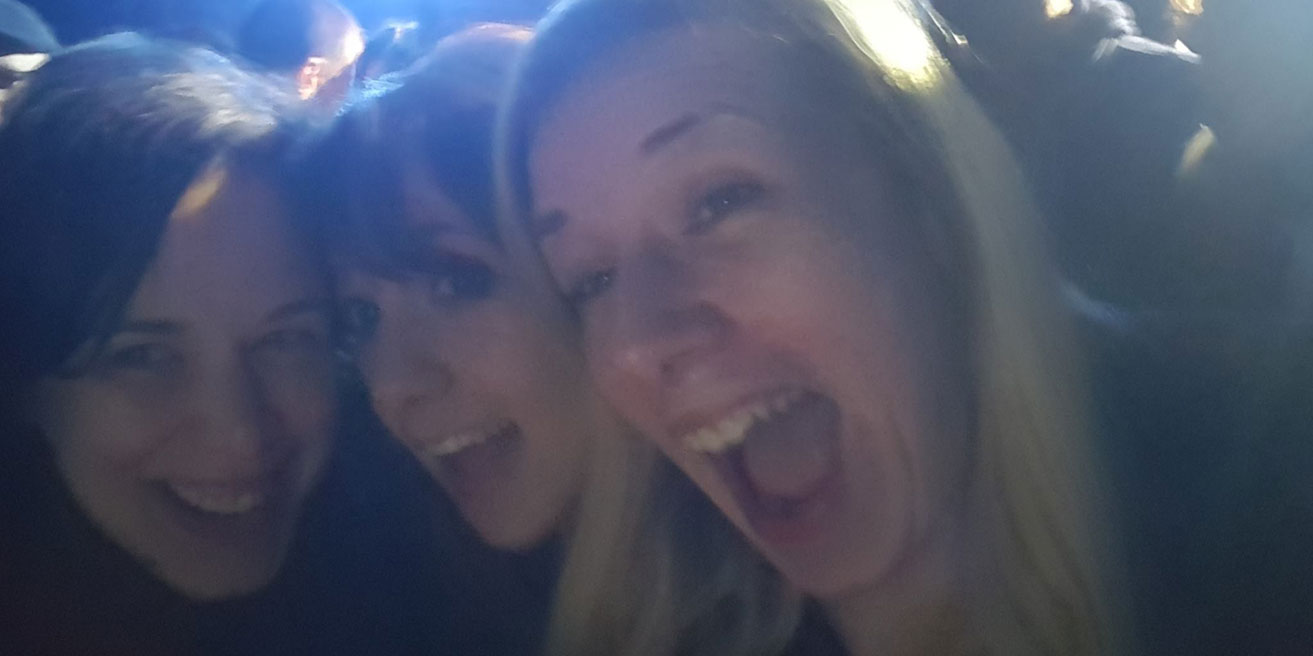
Me (far right) very excited, before seeing Massive Attack in Bristol on their Mezzanine XXI tour in 2019.
- Physical hyperactivity. From when I've needed to go over something on one of my Kim Raine masterclass calls, I have seen that in a room full of ADHD women, usually only myself and Kim are the most physically active. I cannot sit still! This and my active brain make long meetings a challenge and I usually feel tired afterwards from trying to stay focused and present. It may be part of the reason why I write so many notes in meetings, although I think this may also come from a fear of not remembering everything, which brings me on to my next point.
- Forgetfulness and object permanence. With a bouncy brain that is firing in all directions at once, it's little wonder ADHDers can appear 'ditzy' or forgetful. We also have an issue with object permanence so sometimes when things are out of sight, they really are out of mind, meaning I easily forget to do things unless I have a reminder.
- Lack of focus, prioritising, procrastination and task switching. ADHD brains are wired for interest and urgency, so I find it hard to focus at the best of times, especially if it's a task I'm not interested in. We tend to view everything of interest as equally important and easily become overwhelmed.
For me, this means I do all the client work first because I love creating for my clients, I want to keep them happy and I know I'm earning money.
However, this means I have had a real tendency to put off all the stuff I don't like – like sales activities unless it's LinkedIn interaction (social media is bad for everyone but it's especially alluring to dopamine-hungry ADHD brains), writing quotes and admin. Starting a task I don't want to do can be like dragging myself through treacle.
I can find it difficult to switch between different types of work, e.g. creative then admin then artwork is quite inefficient.
All this is down to how ADHD brains essentially have a faulty switch between the Default Mode Network (responsible for creativity and free thought) and the Task Positive Network (for doing tasks that require conscious attention). The DMN is also more active in ADHD brains too. Neurotypical brains can stay in one neural pathway at a time, but in ADHD brains these pathways compete. - Hyperfocus. ADHD is full of paradoxes. While I'm easily distracted, I can slip into hyperfocus in the right circumstances. If there is interest and/or urgency I can be enormously productive in a short or extended period. The world around me ceases to exist when I'm in hyperfocus.
However, it can be a problem if I'm not focused on the right thing, for example disappearing into an unnecessary research wormhole. Like other ADHDers, I can forget to eat, drink or go to the toilet so when coming out of hyperfocus I can become suddenly aware that I don't feel that great. It's a prime way to reach burnout too. - Hyperfixation. This is having a special interest for an extended period of time. At the moment, I admit I do have a bit of a hyperfixation on ADHD because it's new, it's validating and I'm meeting some lovely people through it. I have hyperfixated on typography – I love to obsess over typefaces and which ones look great together. This is of course beneficial to my work and clients!
Anyone that knows me well knows how obsessed with music I am, the breadth and depth of my knowledge, and the variety of my taste varying from well-known names to niche artists. It provides an endless stream of mini hyperfixations in the form of my favourite song, album or artist of the moment. I've shared a blog post already about my record collection. I love going to gigs so much, I was randomly screaming with excitement while driving to ArcTanGent Festival last summer and cried with joy when I was there. I got so excited I felt sick and had to have a word with myself before I saw Massive Attack in Bristol on their Mezzanine XXI tour. I know none of this is normal for a middle-aged woman... but now I know it's because my brain is not normal!

- Empathy, Rejection Sensitivity Dysphoria and huge emotions. As described above about music, I have huge emotions. The highs are really high. Going to a good gig can be a completely transcendent and soul-nourishing experience. I wonder if I feel joy more intensely than neurotypical people.
The lows are obviously horrible and include Rejection Sensitivity Dysphoria. RSD is a condition that commonly co-exists in ADHDers. For me, it is characterised by intense feelings, to the point where I feel them physically. These happen when I fear I have upset or let someone down, even if it hasn't actually happened. This is something I have always struggled with but as I get older, I have learned to deal with these intense feelings healthily to help me move on.
At work, I try to keep things under wraps to maintain a professional image but it's often all going on behind the scenes. Combined with my ADHD-typical capacity for empathy, the huge emotions can be really helpful with clients in developing relationships by being very real and honest. I quickly pick up on my clients' passion for what they do and invest it in creating the best work possible with enormous energy. - Perfectionism and overthinking. It takes me far too long to put emails, quotes and proposals together. They are not tasks I enjoy doing. Although I am good with maths, number crunching does not fill me with joy.
I think several ADHD traits play a part here. Firstly we know if it's a task I don't enjoy, it can be hard to get started and stuck in. Secondly, I want to ensure everything is covered when communicating with clients so they know what to expect, my business expenses are covered and the fee is right. Having quotes turned down is an inevitable part of business but I think it's that fear of rejection – part of Rejection Sensitivity Dysphoria – that causes me to perfect every communication with clients and I think it's a sneaky way for my brain to put off sending the email to avoid the rejection. In a way, it's a good thing because I have attention to detail but I know I have wasted so much time over the years trying to force my brain to do these tasks in a neurotypical way. - Time blindness. I did not know until doing Kim Raine's ADHD Business Mastery programme, that ADHDers do not experience the passing of time, including me! I thought no one does because it’s normal for me!
Time blindness can cause me to overfill my schedule if I have lots of fun projects on. I can underestimate how long it will take to do them and how long it takes me to switch tasks. I always manage to deliver client projects on time because I don't want to let them down (hello there, RSD) but what happens is I then put off less appealing tasks, like sales activities (RSD hell!) and admin tasks that benefit my business. I also run the risk of doing too much and burning myself out.
Time blindness can cause poor timekeeping. RSD has made me fear being late and worry about letting people down but time blindness fights against it. Generally, I tend to be just about on time... but I might have been stressing when I hit traffic on the way and hadn't quite left early enough! If there's public transport involved I can be hideously early because of the added fear of missing the train or it being delayed. - Resilience and resourcefulness. I've had to overcome a lot of unusual challenges in my life and particularly in the last few years. ADHDers are adept at getting back up after a setback and I'm no different. My bouncy brain has enabled me to plough through every difficulty, using creativity to problem solve and energy to rally the troops. This is helpful at work if projects hit on a snag. One of my mottos is "there's always a way" - because there is, you just have to find it!
At times, ADHD feels like a superpower. I feel I can do anything, imagine anything and I have the energy and passion to take on the entire world. On the flip side, it's a constant struggle to stay focused and get things done, there are so many ways I can easily burn out, including masking, and it has led to not feeling particularly good about myself in the past.
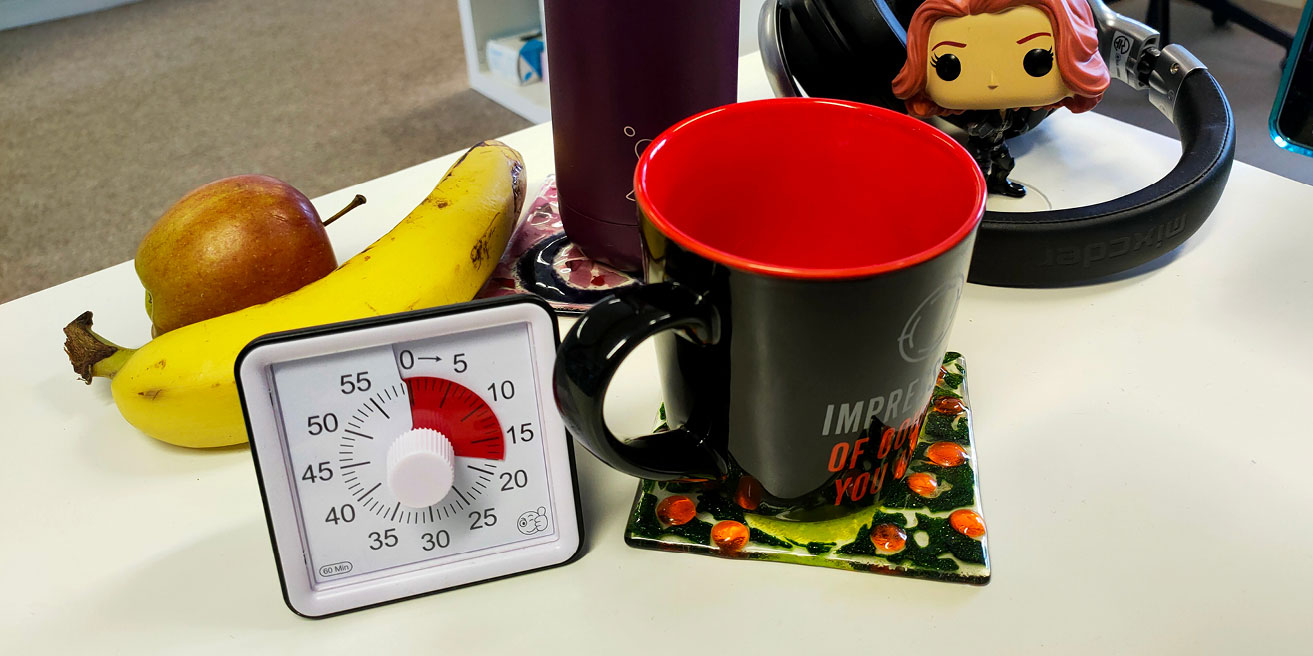
Everything I need for a productive day in the studio: phone out of sight, healthy snacks, visual timer, bottle of water, coffee (finished... but it was cold as usual by the time I finished it. I forget it's there while I'm working) and my Black Widow Funko Pop (yep, Marvel has been a hyperfixation) looking after my headphones if I really need to hyperfocus.
What am I doing about it?
I refuse to use ADHD as an excuse. It's the reason I experience difficulties but it's not an excuse to do nothing about it.
I've unintentionally found a few ways of managing my ADHD before knowing what I was dealing with. Some of them are helpful and some not so much. Learning more about ADHD and completing the ADHD Business Mastery course has given me a lot more tools for working with my brain, not against it.
Here's what I do:
- Send myself emails. When I have ideas or thoughts about work when I'm not at work, rather than opening my laptop which I just know will be a can of worms, I send myself an email. It's not uncommon to get back to work on a Monday morning and find four or five emails from myself at strange times! This also helps prevent me from having an “itchy brain” where I keep thinking about the thing for fear of forgetting it.
- Set reminders, so many reminders. My phone is full of them! This is a prime example of how I've masked ADHD for so long. I don't think many people realise how forgetful I am without those reminders, calendars and plans!
- Exercise and diet. Maintaining a healthy lifestyle is helpful for everyone but especially helps reduce ADHD symptoms and burn off hyperactive energy. I've recently found that if I have caffeine after noon, it usually impacts my sleep so now I switch to decaff in the afternoons.
- Visual timer. This little guy is amazing. Sometimes I just set ten minutes to encourage myself to get started on a task I don't want to do. Sometimes I set half an hour because I know I'm going to fall into hyperfocus and forget to drink enough water – I've done exactly that while writing this blog! Sometimes it's handy at home because I know I've got to put the broccoli on to boil for dinner in ten minutes but I don't want to get distracted with my phone or sidetracked for too long while I fold the clothes.
- Kim Raine's ADHD Business Collective. I learnt so much in the Business Mastery course but I worried about not following through with my learnings – something very common with ADHD people. I've joined the Business Collective and particularly find the body doubling and strategy sessions useful for keeping myself accountable and on track. The body doubling sessions are fantastic for all those tasks I don't enjoy.
- Reading more books. I've almost finished reading Kim Raine's book Square Pegs but have Women with ADHD by Sari Solden, Scattered Minds by Gabor Maté, ADHD 2.0 by Ed Halliwell and Your Child Is Not Broken by Heidi Mavir on the list.
- Reaching out to others in the ADHD and neurodiverse community. I've made some friends on the Kim Raine programmes and have already been talking about neurodiversity on social media. Now I have my diagnosis I feel more confident doing this.
- Finding tools to help speed up writing. I've been looking at options including dictation and grammar software and a Remarkable tablet.
- Grouping tasks. I'm being smarter with my scheduling and getting tasks of the same type done consecutively.
- VITs. These are Very Important Tasks. To help me stay focused on what is important and not try to cram too many things in my day, at the start of each day I identify up to three, and an absolute maximum of five tasks that have to be done that day.
- No screens after 9pm. This is tricky because phones are so alluring to a dopamine-hungry brain but reading or doing another activity later in the evening does have a positive impact on the quality of my sleep that night.
- Listening to my body. This is something that I've been starting to do a lot more but especially now I know I can easily go too far and push into burnout. I know why I need so much sleep and why it's hard to get enough. I'm more forgiving of myself and try to take time out regularly, rather than when I'm burnt out and my body gives me no choice by shutting down.
- Self-forgiveness. There's no point beating myself up for things I could have done better. I know I find some tasks difficult and I can use each error as an opportunity to learn how to work with my neurodiverse brain more productively.
- I may try medication. I was pretty against this because I worried it might dampen my energy and creativity but I've been told that if it works well, it won't do that and should even out the lack of focus with hyperfocus. I know meds don't work for everyone and I may experience side effects but I think it's worth a shot. I also know even if they work, they won't cure ADHD, but just make it more manageable.

Is there anything people working with me should do differently?
Not really! Certainly, nothing that wouldn't benefit everyone.
- Keep meetings short. I do struggle to stay focused in long meetings and it's in everyone's interest to keep meetings as efficient as possible. I realise this includes me trying not to talk too much so I'll take responsibility for that! If the meeting does have to be long, let's try and have a quick break. That bit of movement will help me focus and probably help everyone else too.
- Be conscious of my time. I might have grouped tasks together for efficiency so it might not be that sensible for me to just jump on a call or make some changes with short notice. I know sometimes it has to happen so I will accommodate you if it's necessary and I am not up against a deadline. Again, I think this one goes without saying as most people have that respect for others' time anyway, regardless of whether they're dealing with neurotypical or neurodiverse people.
- Give constructive feedback. Alterations are usually necessary for design projects, but it doesn't help anyone – neurotypical or neurodiverse – if feedback is not helpful or worse, if it's delivered in an insensitive way. If it's not right – try to give some detail like “could we give this section more impact by making the background darker, please?”
- Share your passion. Don't be afraid to show that you love what you do. I will pick up on that and fill your project with energy and creativity.
A partnership made in heaven?
Feeling inspired? We'd love to help! We are a team of collaborators that enjoy nothing more than partnering with ambitious clients. Get in touch if you'd like to talk through your next project or get some advice.



